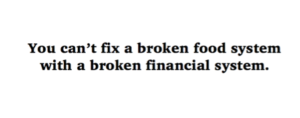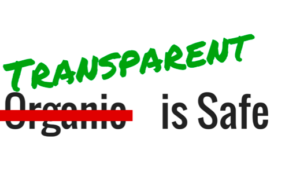What Wall Street Is Doing to the Food System
While food companies have a laser focus on sourcing their ingredients, they fail to do the same when sourcing their capital.
The truth is that a healthy food system starts with healthy financing. You can’t fix a broken food system with a broken financial system.
It turns out that uneducated capital and unbridled greed are some of the most dangerous ingredients in our food system.
And right now, we’ve got both. The financial system is compromising the food industry.
When Campbell Soup CEO Denise Morrison stepped down earlier this year, she became the fifteenth CEO of a packaged food company to leave their job in the last 18 months. The stock had been hammered, after the company made acquisitions to get itself on track with the 21st century consumers.
 As CNBC reported back in May, “It is a challenge for a CEO to gather support from a company to shift its focus from namesake money-makers to bets on growth. That’s even in the face of packaged food company sales slowing last year to 1.2 percent, according to Euromonitor.”
As CNBC reported back in May, “It is a challenge for a CEO to gather support from a company to shift its focus from namesake money-makers to bets on growth. That’s even in the face of packaged food company sales slowing last year to 1.2 percent, according to Euromonitor.”
Morrison didn’t have the runway, and her tenure is now over.
Only private food companies like Mars and now Patagonia are allowed the runway to experiment with bets like its recent stake in bar-maker Kind, which valued the brand at at least $3 billion.
Not to mention, “Today’s diners want their food fresh, not with preservatives. They are suspicious, rather than impressed, by century-old brands.” Many of these companies were once members of the Grocery Manufacturers Association, a trade group that ferociously lobbied against the labeling of GMOs. So much is changing so quickly, that this same group has now called on the country’s government to order the disclosure of refined ingredients from bio-engineered (GMO) crops on food labeling.
The DNA is definitely changing at these companies as the leadership changes, and a lot of these brands are looking into dealmaking to solve their problems. But instead, what they need to be doing is taking a hard look at themselves, an internal assessment, before trying to find a partner that will solve their problems. All too often, only to find that they lack the skill-set, culture and supply chain required to grow them.
Many have now launched a venture capital arm, hoping to catch new trends.
But as a former executive at one of the world’s largest food companies recently shared, “That’s a good PR story, but those deals don’t put a dent in earnings.”
And the valuations on some of these deals are reminiscent of the tech bubble days.
“As companies seek growth and scale, bigger deals have leaped the most in valuation. The multiple for deals valued at more than $1 billion, jumped from 13 times EBITDA in 2016 to 20 times EBITDA in 2017, according to Dealogic. The multiple on deals valued below $500 million edged slightly down from 20 times to 19 times,” CNBC reports.
So what tends to happen?
“Several years into these efforts though, many of today’s biggest successes, like Kind Bar, have originated outside such incubators. The culture of start-ups, where failure is inevitable, differs starkly from a publicly traded company tied to quarterly expectations and the need to show return on investment.”
The Financial Times recently ranked the cultures of the largest food companies. Not surprisingly, Kraft-Heinz landed dead last. When you kill creative disruption, create a culture that silences imaginative innovation and focus on cost cutting not growth, culture suffers. Standard operating procedures become the norm, when disruptive innovation should be.
Which gets to the heart of the problem. You cannot fix a broken food system with a broken financial system. One failing system built another failing system.
Why are we surprised?
In my conversations with leadership teams over the last few years, I will say: “Wall Street has you by the throat. How are you able to invest in regenerative, organic, sustainable farm and food systems on a quarterly earnings schedule?”
“Quarterly earnings expectations are killing us,” is usually the reply.
And they’re killing our supply chain, the very thing that these CEOs and companies need to grow their businesses. Right now, about 1% of U.S. farmland is organic. So it doesn’t matter if you’re the CEO of Kraft or Patagonia, the supply does not currently exist to meet the demand.
If farmers tend to only lease farmland on a one-year lease, what long-term incentive is in place in the public markets to protect that land, soil and water used on it? There isn’t one. Earnings calls should include questions like:
- What percentage of your farmland is organic?
- What programs does your company have in place to convert farmland to organic?
- What programs does your company have in place to support farm workers?
- What do you have in place to restore the soil and regenerate agriculture?

And right now we don’t have either at a scale large enough to sustain us.
The tsunami of capital that is coming into the natural and organic space isn’t always a good thing either. We saw something similar play out in the markets in the late 90s during the tech bubble. There was too much capital and too few deals with integrity.
There is a lot of passion to make a quick buck. And many of these entrepreneurs can tell a good story, but uneducated capital and unbridled greed are some of the most dangerous ingredients in our food system.
The companies that have the most bandwidth and freedom to engage in long term strategic goals are those that are privately held: Patagonia, Mars and the smaller companies.
The fate of the publicly held food companies right now is squarely in the hands of its investors.
It takes three years to convert a farm from genetically engineered crops to organic, that doesn’t meet the Street’s quarterly earnings appetite.
Which begs the question: should these companies begin to spin off divisions and privatize them? It would give them the bandwidth needed to invest in regenerative, organic growth.
Restorative, regenerative agriculture begins with restorative, regenerative finance. Capital can be part of the problem or part of the solution.
We have flushed away more resources in our food system than is morally responsible. We waste 40% of what we produce; we tax the land, the soil, the water and the air with the inputs that we’ve used.
But what can be called a crisis can also be called an opportunity.
Food security is national security and national security is food security.
We must consider all of the inputs in our food system, from immigrant farm workers to seed capital, if we are truly going to regenerate food and build a secure and sustainable model for those who depend on it every day.
It’s time to table a better food system, and that starts with sourcing educated capital and employing metrics relevant to 21st century families.
